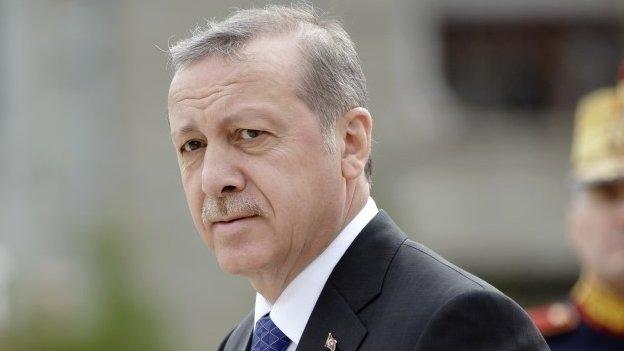Germany Turkey: Satire row stirs free speech fears
- Published
Jan Boehmermann could be prosecuted under German law for insulting a foreign head of state
Irreverent to the point of discomfort, politically savvy with no holds barred, Jan Boehmermann pushes humour well over the border of what is generally seen as acceptable.
Everyone is fair game. Most often his fellow Germans. The ones who hate foreigners, external.
And the vehemently nice ones, external, determined to save the planet and help refugees.
But Turkey's President, Recep Tayyip Erdogan, is clearly not amused. In fact many in Germany do not find Boehmermann's controversial obscene poem particularly amusing either.
It is seen even by some of the satirist's fans as puerile and vulgar, with childish references to genitalia as well as sex with goats and sheep.
But the general consensus is that whether you find the poem itself funny or not, the comedian should not be prosecuted for it.
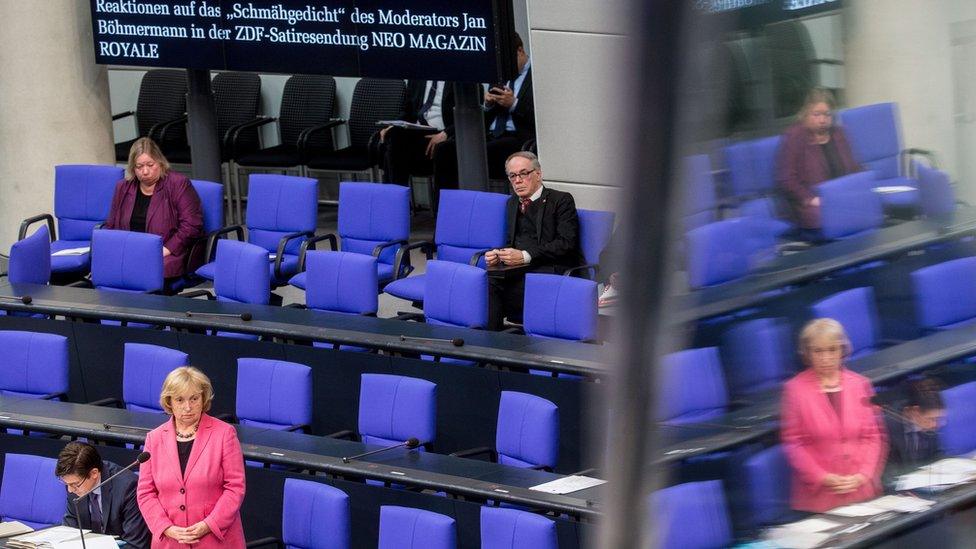
Boehmermann's obscene poem was raised in the German parliament
In true Boehmermann fashion, the poem was more complicated than simply a string of obscenities.
It was prefaced with an explanation that the poem was illegal in Germany, in reference to an Erdogan parody on German TV that the Turkish president had taken offence to days before.
The joke presumably was that in Germany you could be fined or even jailed for saying something so childish; and it highlighted Germany's own problematic issues with free speech.
That is why Boehmermann refuses to back down. "What appears to have been overlooked is that the poem was not broadcast on its own, but rather as part of an overall presentation about what is allowed in Germany and what isn't," as his lawyer explained on Thursday.
President Erdogan's German lawyer has urged the satirist to "make a commitment not to recite [the poem] again."
That does not seem likely. Boehmermann has made it clear he will not sign a cease-and-desist declaration.

Erdogan runs the show - analysis by Mark Lowen, BBC News, Istanbul
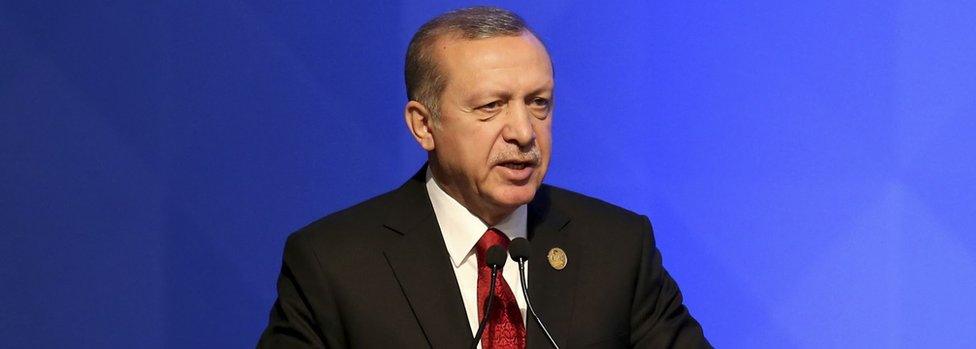
President Erdogan holds leverage over Angela Merkel at the moment, and he knows it. The German chancellor used to chide the Turkish president over freedom of expression, stressing her opposition to Turkey's EU accession.
Suddenly Turkey is essential to stopping the migration flow to Europe and Mrs Merkel is treading very carefully.
Turks have almost stopped raising eyebrows when a case of "insulting the president" is opened, so often does it happen. Initially, when a former Miss Turkey, the country's most famous cartoonist or a 13-year-old boy were accused of insulting Mr Erdogan, there was shock among the president's opponents.
But now, with almost 2,000 such cases opened, there is little surprise left - even when the target is a German citizen.
Mr Erdogan's critics cry foul, his diehard fans rally. And as long as he has his support base, Turkey's president is secure.

Jan Boehmermann's style is complicated self-parody at its best.
"We are Germans," he sings in one video, external, renowned for "our world-famous sense of humour".
The song mercilessly highlights how, during the Greek debt crisis, German society was simultaneously terrified of a vengeful Greek Finance Minister Yanis Varoufakis, and in thrall to his biceps and upturned silk collars.
"Our minister of finance doesn't even have legs" - referring to the wheelchair-using German Finance Minister Wolfgang Schaeuble - is not a line most comedians would feel comfortable delivering.
President Erdogan may not get the joke but Mr Varoufakis does.
"He did me a lot of harm as minister of finance, but I have to say I appreciated the quality of his satire," Mr Varoufakis told German TV channel RTL. "I'll be damned if I see someone like him being prosecuted by people who oppose basic democratic liberties."
The legal fight is complicated by the fact that some of the references to Mr Erdogan could be interpreted as discriminatory against Turkish people, Germany's largest minority.
German public prosecutors have now launched a criminal investigation into Boehmermann and some of public broadcaster ZDF's programme directors.
However, an investigation does not mean that a crime has been committed. No one has yet been charged, let alone convicted.

Has Boehmermann broken the law?

Here's article 103 of Germany's criminal code: Defamation of organs and representatives of foreign states
(1) Whosoever insults a foreign head of state, or, with respect to his position, a member of a foreign government who is in Germany in his official capacity, or a head of a foreign diplomatic mission who is accredited in the Federal territory shall be liable to imprisonment not exceeding three years or a fine, in case of a slanderous insult to imprisonment from three months to five years.

This case has now turned into a political problem for Germany's government.
Chancellor Angela Merkel has defended artistic freedom and insists that Article 5 of the constitution protects "freedom of opinion, freedom of science and of course the freedom of art". Given Germany's painful 20th-Century history of oppression and dictatorship, these values are not taken lightly here.
But the chancellor has to decide whether Germany's state prosecutors should start criminal proceedings against the satirist, because article 103 of the criminal code can only be triggered with authorisation from the German government.
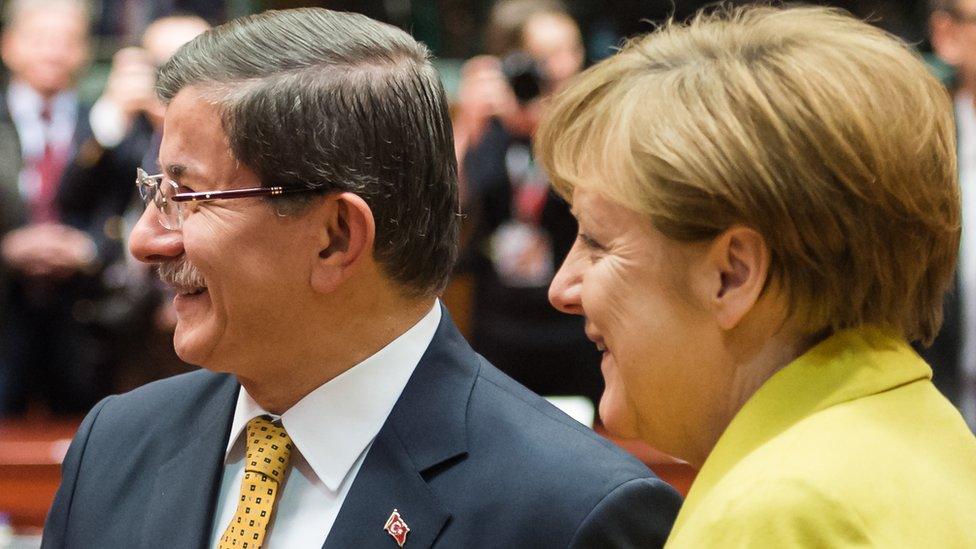
The German chancellor spoke to Turkish PM Ahmet Davutoglu after Boehmermann's poem was broadcast
Chancellor Merkel uncharacteristically waded into the debate precipitously on Tuesday by saying the poem was "intentionally insulting". Her allies covered her back, saying she was simply expressing a personal opinion about the quality of the poem.
But the damage was already done, particularly because the legal question revolves around whether the poem was meant to be intentionally insulting or not.
The difficulty for the chancellor is that if she allows the prosecution to go ahead she will be criticised for letting President Erdogan limit free speech in Germany.
But if she blocks it, she risks antagonising Mr Erdogan at a time when Europe needs Turkey to help solve the migrant crisis.
- Published12 April 2016
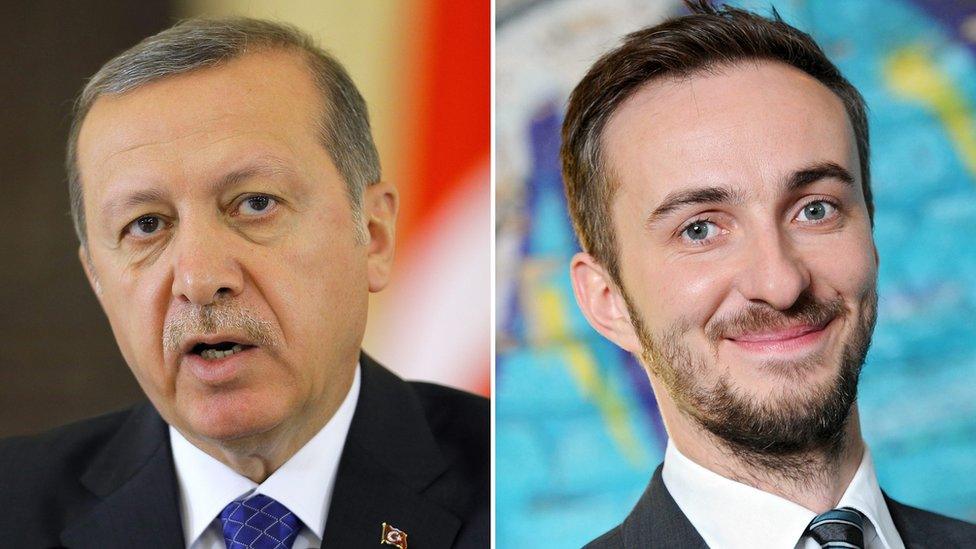
- Published19 March 2015

- Published6 August 2015

- Published16 April 2015
